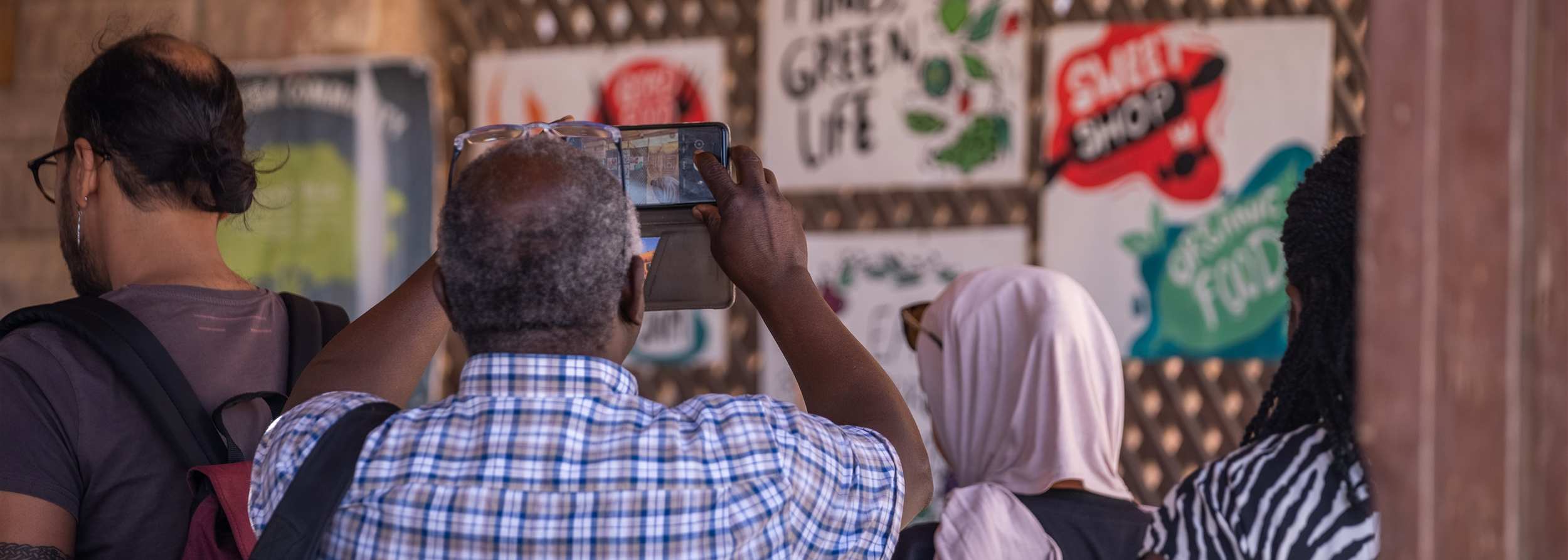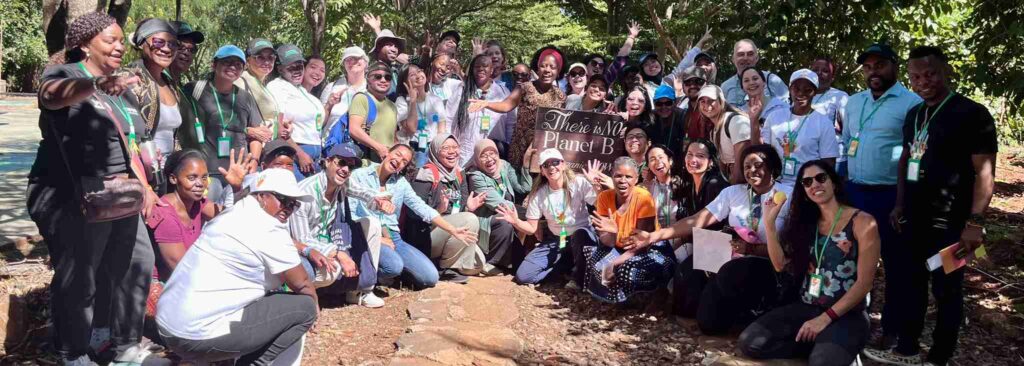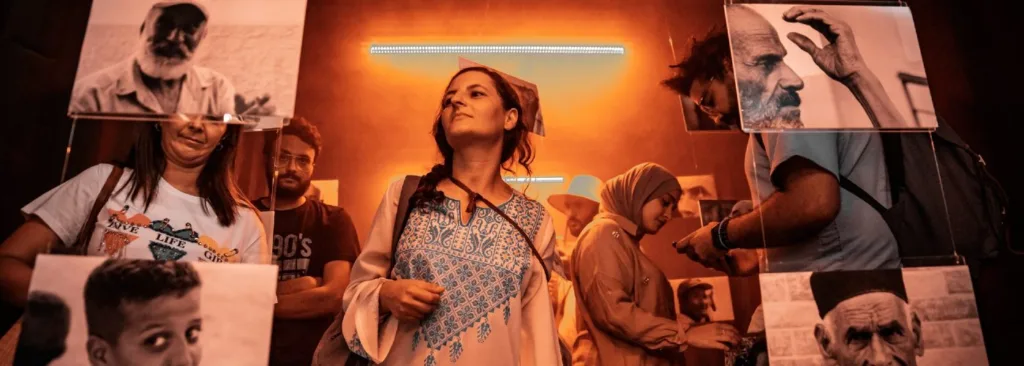SharaKa – for Inclusive Climate Action is a new Hivos program that tackles climate justice challenges in Jordan, Lebanon, Tunisia, and Palestine (oPt) by bringing together civil society and media actors to jointly conduct effective advocacy. An important part of this initiative is the program’s MENA Climate Justice Platform (MENA-CJP), a pioneering space for uniting climate justice efforts across the region.
In this interview, Program Officer Zina Nasr shares her insights on the objectives and future of SharaKa, as well as the potential impact of MENA-CJP. Our MENA communication officer, Imen Boudali, caught up with Zina at Café Panorama in Tunis’ lively Medina.
Can you introduce the SharaKa program and its main objectives?
SharaKa – for Inclusive Climate Action wants to promote climate justice in Jordan, Lebanon, Tunisia, and Palestine (oPt) by enabling civil society and citizens to develop inclusive climate initiatives that are taken up by decision and policy makers.
It plans to establish a learning network that connects local climate CSOs and activists with independent media outlets so they can work together to spread enaging and inclusive climate information among the broader public. It’s implemented by Hivos, Internews, the Arab Reform Initiative (ARI), and the Arab Reporters for Investigative Journalism (ARIJ).
I heard the SharaKa team is creating something called the MENA Climate Justice Platform (MENA-CJP). Can you tell us more about it?
Yes. The platform will bring together 18 representatives from CSOs, activists and natural resource defenders across Lebanon, Jordan, Tunisia, and Palestine (oPt). A unique aspect of MENA-CJP is its partnership with media outlets, creating a direct channel for advocacy and public engagement on pressing climate justice issues.
The platform’s primary goal is to unify climate justice priorities for effective regional advocacy. Led by 18 core members, the platform will coordinate efforts to address urgent climate justice challenges in the MENA region. Media partners, through the Earth Journalism Network chapter in MENA led by Internews, will work with the platform to ensure its recommendations are amplified to key stakeholders at regional and international levels.
SharaKa will be instrumental in making CSOs’ climate justice advocacy more effective and secure. It will also facilitate connections between CSOs and media partners so they can work closely together. As a key supporter of MENA-CJP, SharaKa will make sure the core members steer the platform’s development, empowering participants to expand its reach by including CSOs and activists from additional countries in the near future.
While not the first climate justice platform in the region, MENA-CJP will be the first to forge a strong connection with media partners, which will significantly strengthen its advocacy efforts.
How did Hivos contribute to the creation of MENA-CJP, and what role is it playing in shaping its vision?
Hivos is committed to making the MENA-CJP a vibrant and sustainable network for advancing climate justice principles. Working with the SharaKa project collaborators, Hivos is selecting the platform’s 18 core members from the four participating countries based on their experience and motivation.
Hivos will facilitate their discussions, guiding them in collectively and inclusively shaping the platform’s vision and mission. These core members will play a central role in governing the platform and determining its future direction.
To ensure inclusivity, Hivos is helping them shape the platform’s priorities locally before scaling up regionally. By involving them in decision-making and governance, Hivos aims to create a sense of ownership that will strengthen the platform’s ability to advocate for climate justice.
Additionally, regular feedback mechanisms and inclusive discussions will ensure that all voices are heard. This approach is sure to make the platform very effective at driving climate justice advocacy across the MENA region.
What are the main challenges civil society faces in addressing climate justice in the MENA region, and how can MENA-CJP help overcome them?
One of the primary challenges for civil society organizations is getting decision-makers to listen to their recommendations. Limited funding is another obstacle holding back bottom-up climate justice initiatives.
Then there is the disconnect between various groups, which limits collaboration and prevents unified advocacy for climate justice. Many initiatives operate in isolation, making it difficult to build a cohesive movement.
MENA-CJP seeks to overcome these challenges by uniting climate justice activists and organizations. Through its robust network, MENA-CJP will amplify demands for high-priority climate actions and policies, increase the visibility of climate justice issues, and create stronger advocacy. This collective effort will make decision-makers take the needs and recommendations of civil society more seriously.
By facilitating knowledge sharing, resource pooling, and strategic collaboration, MENA-CJP will allow activists to work more effectively and jointly build a more powerful movement for climate justice in the region.
Looking ahead, what are your hopes for the future of MENA-CJP and its impact on climate action in the region?
Creating a unified voice for climate action in the MENA region is a significant challenge, especially given the economic hardships, civil unrest, and conflicts affecting many countries. However, we are confident in the next generation’s ability to elevate MENA-CJP by building on existing networks.
By working closely with media outlets and like-minded organizations, we hope to create a more cohesive regional movement. As it gains new members, MENA-CJP will grow more influential, expanding its reach to other countries through a well-defined framework.
We envision MENA-CJP as an independent, self-sustaining platform, driven by its members to amplify climate action voices both regionally and globally. Our ultimate goal is to drive meaningful policy change across the region and beyond.




